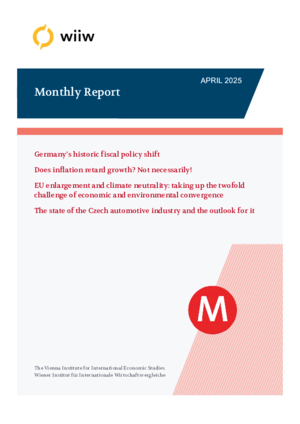Monthly Report No. 4/2025
Alexandre Bernier, Doris Hanzl-Weiss, Philipp Heimberger, Michal Hrubý, Ambre Maucorps and Leon Podkaminer
wiiw Monthly Report No. 4, April 2025
56 pages including 2 Tables 36 Figures and 2 Boxes
- Chart of the month: Germany’s historic fiscal policy shift
by Philipp Heimberger
- Opinion Corner: Does inflation retard growth? Not necessarily!
by Leon Podkaminer
Inflation is commonly believed to lead to various misfortunes – above all, the misallocation of productive resources. However, seemingly over the longer run it correlates positively with per capita GDP growth: it appears that the higher the inflation, the faster the economic growth. Against this background, one of the sources of weakness in the euro area economy may have been the overactive fight against inflation, rather than inflation itself.
- EU enlargement and climate neutrality: taking up the twofold challenge of economic and environmental convergence
by Ambre Maucorps and Alexandre Bernier
The EU’s goal of achieving climate neutrality by 2050 has recently been embraced by EU candidate countries, demonstrating their commitment to reducing polluting emissions. Although their recent progress on the carbon intensity of their economies has been promising, their heavy dependence on fossil fuels and the limited fiscal room they have cast doubt on their capacity to meet EU environmental performance standards. Without substantial support from the EU even before accession, it is unlikely that candidate countries will manage to decarbonise their economies sufficiently by 2050 to be on a par with the rest of the EU.
- The state of the Czech automotive industry and the outlook for it
by Doris Hanzl-Weiss and Michal Hrubý
This article considers the state of the Czech automotive industry and the outlook for it, and sheds light on two aspects of it – cars and battery production and exports – making various comparisons with Slovakia. It highlights Czechia’s relatively robust production portfolio, with its increasing share of electric vehicles, its reliance on geographically close export markets with low geopolitical risk, and its ongoing integration into battery supply chains (albeit with a heavy reliance on imported battery cells). While the overall outlook for the automotive industry may appear gloomy, Czechia could hardly have entered this period in a better position.
- Monthly and quarterly statistics for Central, East and Southeast Europe
Reference to wiiw databases: wiiw Annual Database, wiiw Monthly Database
Keywords: fiscal policy, debt brake, inflation, economic growth, climate neutrality, GHG emissions, fossil fuels dependence, automotive industry, electric vehicles, batteries
Countries covered: Czechia, EU, EU candidate countries, Germany, non specific, Slovakia
Research Areas: Macroeconomic Analysis and Policy, Sectoral studies
